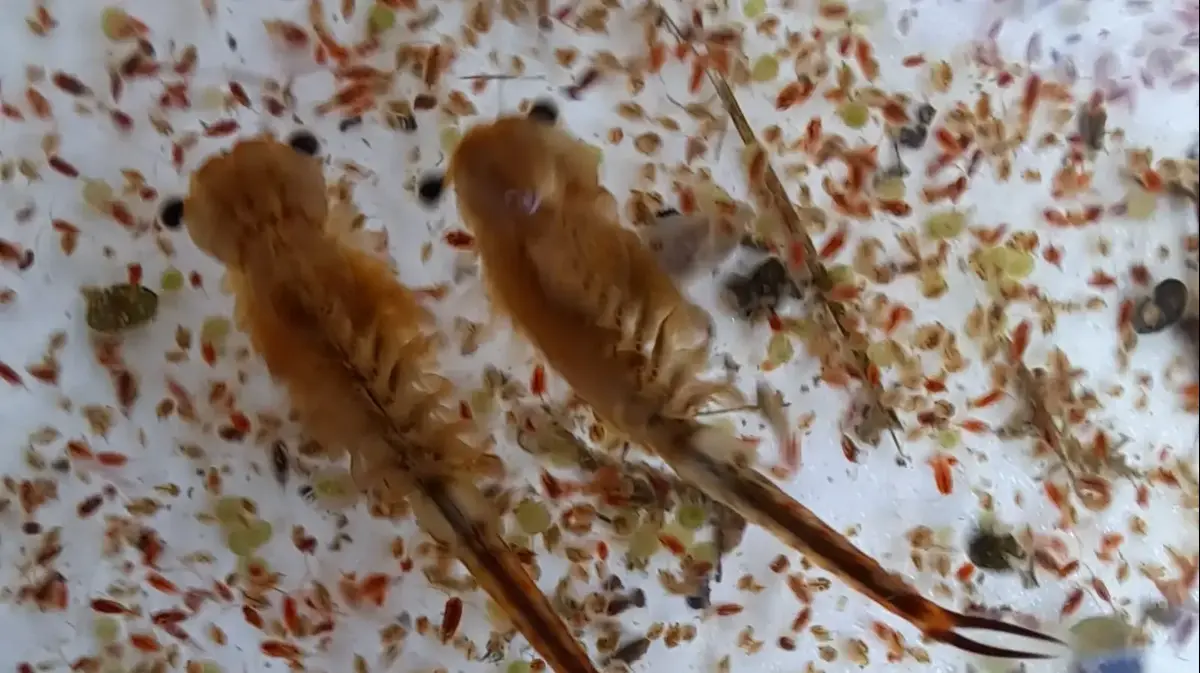Bozen crabs, daphnias, clams and cyclops/photo: Yitzhak Cohen, Society for the Protection of Nature
A few weeks ago, a nature survey began in the city of Modi'in, conducted by members of the Society for the Protection of Nature for the Municipality of Modi'in Maccabim Re'ot, with funding and support from the Ministry of Environmental Protection, and already in the first days the surveyors discovered a particularly exciting find: two rather rare species of crabs - the flounder and the Land of Israel Zimmergal.
Yitzhak Cohen, a senior surveyor in the Urban Nature Unit of the Society for the Protection of Nature, who found the crabs, says that the initial survey included a visit to the survey sites and an initial study of their quality, and an examination of the rock tops and winter pools in the city for the flora and fauna in them.
According to him, during the survey, a very impressive variety of rare plant species and invertebrates unique to seasonal bodies of water at the back of a rock, and winter pools was discovered and that the two species of crabs were found for the first time in the Modi'in area.
Also, more common species were found in winter ponds, such as a reddish foot, cyclops, daphnia, and sea cucumbers, and during the review, rare plant species were also found - the crooked-seeded altine, the puddle ankle, and the truncated sedge, known in Israel only from the Golan and Upper Galilee regions, and its discovery in Modi'in represents an expansion of the species' distribution This rare.
"The place of the state and to this day, the area of the humid habitats in Israel has been reduced from 180,000 dunams to only about 10,000, and in the last decades in particular, many winter pools have been dried up for the sake of development and construction. According to a survey of winter pools by the Nature and Parks Authority, the pond is present in only 18 percent of the winter pools In Israel, while the Eretz-Israeli Zimmergal is present in only 10 percent of the winter pools that were sampled, therefore it is of great importance to preserve the habitats where they were found," he says.
Wagtails, daphnias, clams and cyclops found in the water bodies in the survey/Society for the Protection of Nature, Yitzhak Cohen
Present in only 10 percent of the winter pools sampled.
An Israelite Zimmergal crab found in intelligence/the Society for the Protection of Nature, Yitzhak Cohen
Surveyors of the Society for the Protection of Nature in Givat Modi'in/Society for the Protection of Nature, Yitzhak Cohen
Damson Kochbani/The Society for the Protection of Nature, Yitzhak Cohen
Thank God: we also found bent-seed altin
The Society for the Protection of Nature adds that the habitat of the top of the rock and the winter pools is very dynamic, filling up with the fall of rain in the winter and drying up after a while, until the next rain or until the next rainy season.
"This feature brings with it many challenges to the life and flora in this habitat, therefore a wide range of biological features and adaptations have been developed to deal with the extreme dynamism of the habitat. For example, many amphibians breed in these streams that must in the stage of reproduction and initial development from water bodies, and after reaching maturity They don't have to be in an aquatic environment. Another adaptation is poor crabs, which live and multiply in the body of water and towards drying up they lay viable eggs, which sink to the bottom of the pond, and when the pond dries up all the adults die and the eggs remain at the bottom until refilled, then hatch again," explains Cohen.
Also, in addition to these species, more common species were found in winter ponds, such as a reddish stilt, cyclops, daphnia and seashells, and during the review rare plant species were also found - the crooked-seeded altine, the puddle ankle and the truncated sedge.
The Puddle Ankle/The Society for the Protection of Nature, Yitzhak Cohen
Pit crab that was first documented in a Intelligence/Society for the Protection of Nature survey, Yitzhak Cohen
"Preparation is also required at the local government level"
During the last decade, the surveyors of the Society for the Protection of Nature conducted approximately 60 urban nature surveys as part of calls from the Ministry of Environmental Protection, and promoted specific initiatives for the planning and management of nature areas in the city.
These surveys provide a comprehensive and up-to-date information base about biodiversity and its location in the urban space and are the beginning of a process that in many cities has already led to the integration of natural infrastructures in promoting sustainable urban management and planning.
Tamar Raviv, Head of the Biodiversity and Open Areas Division at the Ministry of Environmental Protection, summarizes: "The variety of rare species that were recently discovered in the Modiin survey reinforces the importance of the local authorities' contribution to nature conservation efforts in Israel and the world, certainly when it comes to rare and threatened habitats. The survey will allow the municipality to concentrate the the information about the open areas and the natural values in its domain and to plan and manage the natural areas in a more correct way, in order to maintain the functioning of the ecological systems and the continuation of the ecological continuity. In an era of climate crisis and ecological crisis, the importance of preserving the ecological systems intensifies, and preparation is also required at the local government level, that he will work to preserve the biological diversity in his field. The trend today in the world is to find nature-based solutions in order to preserve the values of nature, and increase urban resilience."
On the website of the Society for the Protection of Nature you can find all the findings of the surveys that have been conducted since time immemorial:
https://did.li/cphrl
More on the same topic:
Crabs
Modi'in Maccabim-Reut

